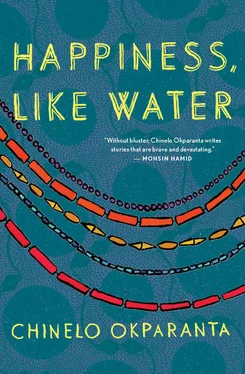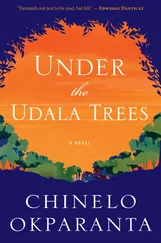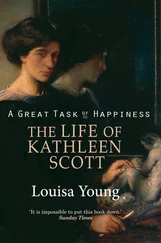‘Boy or girl?’ I ask, feeling genuinely excited for her.
‘We don’t know yet,’ she says. ‘But either one will be a real blessing for my marriage. My husband has never been happier,’ she says.
I turn my head to look out the window, but then I feel her gaze on me. When I look back at her, she asks if I have a husband or children of my own.
I think of Mama and I think of Gloria. ‘No husband, no children,’ I say.
The day I confessed to him about Gloria, Papa said: ‘When a goat and yam are kept together, either the goat takes a bite of the yam, bit by bit, or salivates for it. That is why when two adults are always seen together, it is no surprise when the seed is planted.’
I laughed and reminded him that there could be no seed planted with Gloria and me.
‘No,’ he said, reclining on his chair, holding the newspaper that he was never reading, just always intending to read. ‘No, there can be no seed,’ he said.
It had been Mama’s idea that I tell him. He would talk some sense into me, she said. All this Gloria business was nonsense. Woman was made for man. Besides, what good was it living a life in which you had to go around afraid of getting caught? Mobile policemen were always looking for that sort of thing — men with men or women with women. And the penalties were harsh. Jail time, fines, stoning or flogging, depending on where in Nigeria you were caught. And you could be sure that it would make the news. Public humiliation. What kind of life was I expecting to have, always having to turn around to check if anyone was watching? ‘Your Papa must know of it,’ she said. ‘He will talk some sense into you. You must tell him of it. If you don’t, I will.’
But Papa took it better than Mama had hoped. Like her, he warned me of the dangers. But ‘love is love’, he said.
Mama began to cry then. ‘Look at this skin,’ she said, stretching out her hands to me. She grabbed my hand and placed it on her arm. ‘Feel it,’ she said. ‘Do you know what it means?’ she asked, but did not wait for my response. ‘I’m growing old,’ she said. ‘Won’t you stop being stubborn and take a husband, give up that silly thing with that Gloria friend of yours, bear me a grandchild before I’m dead and gone?’
‘People have a way of allowing themselves to get lost in America,’ Mama said when I told her that Gloria would be going. Did I remember Chinedu Okonkwo’s daughter who went abroad to study medicine and never came back? I nodded. I did remember. And Obiageli Ojukwu’s sister who married that button-nosed American and left with him so many years ago? Did I remember that she promised to come back home to raise her children? Now the children were grown, and still no sight of them. ‘But it’s a good thing in this case,’ Mama said smugly. She was sitting on a stool in the veranda, fanning herself with a plantain leaf. Gloria and I had been together for two years by then, the two years since Mama walked in on us. In that time, Gloria had written many more articles on education policies, audacious criticisms of our government, suggesting more effective methods of standardizing the system, suggesting that those in control of government affairs needed to better educate themselves. More and more of her articles were being published in local and national newspapers, the Tribune, Punch , the National Mirror and such.
Universities all over the country began to invite her to give lectures on public policies and education strategy. Soon she was getting invited to conferences and lectures abroad. And before long, she was offered that post in America, in that place where water formed a cold, feather-like substance called snow, which fell leisurely from the sky in winter. Pretty, like white lace.
‘I thought her goal was to make Nigeria better, to improve Nigeria’s education system,’ Papa said.
‘Of course,’ Mama replied. ‘But, like I said, America has a way of stealing all our good ones from us. When America calls, they go. And more times than not, they stay.’
Papa shook his head. I rolled my eyes.
‘Perhaps she’s only leaving to escape scandal,’ Mama said.
‘What scandal?’ I asked.
‘You know. That thing between you two.’
‘That thing is private, Mama,’ I said. ‘It is between us two, as you say. And we work hard to keep it that way.’
‘What do her parents say?’ Mama asked.
‘Nothing.’ It was true. She’d have been a fool to let them know. They were quite unlike Mama and Papa. They went to church four days out of the week. They lived the words of the Bible as literally as they could. Not like Mama and Papa, who were that rare sort of Nigerian Christian who had a faint, shadowy sort of respect for the Bible, the kind of faith that required no works.
‘With a man and a woman, there’d be no need for so much privacy,’ Mama said that day. ‘Anyway, it all works out for the best.’ She paused to wipe with her palms the sweat that was forming on her forehead. ‘I’m not getting any younger,’ she continued. ‘And I even have the names picked out!’
‘What names?’ I asked.
‘For a boy, Arinze. For a girl, Nkechi. Pretty names.’
‘Mama!’ I said, shaking my head at her.
‘Perhaps now you’ll be more inclined to take a husband,’ she said. ‘Why waste such lovely names?’
The first year she was gone, we spoke on the phone at least once a week, but the line was filled with static and there were empty spots in the reception, blank spaces into which our voices faded. I felt the distance then.
Still Gloria continued to call, and we took turns reconstructing the dropped bits of conversation, stubbornly reinserting them into the line, stubbornly resisting the emptiness.
The end of that first year, she came back for a visit. She was still the same Gloria, but her skin had turned paler and she had put on a bit of weight.
‘You’re turning white,’ I teased.
‘It’s the magic of America,’ she teased back. And then she laughed. ‘It’s no magic at all,’ she said. ‘Just lack of sunlight. Lots of sitting at the desk, writing, and planning.’
Perhaps she was right. But it was the general consensus in Port Harcourt (and I imagine in most of Nigeria) that things were better in America. I was convinced of it. I heard it in the way her voice was even softer than before. I saw it in the relaxed looks on the faces of the people in the pictures she brought. Pictures of beautiful landscapes, clean places, not littered at all with cans and wrappers like our roads. Snow, white and soft, like clouds having somehow descended on land. Pictures of huge department stores in which everything seemed to sparkle. Pictures in which cars and buildings shone, where even the skin of fruit glistened.
By the time her visit was over, we had decided that I would try to join her in America, that I would see about getting a visa. If not to be able to work there, then at least to study and earn an American degree. Because, though she intended eventually to come back to Nigeria, there was no telling how long she would end up staying in America. The best thing for now was that I try to join her there.
I think of Gloria as my head jerks back and forth against the window of the bus. I try to imagine her standing in a landscape like the one in the pictures she’s sent. A lone woman surrounded by tall cedars and oaks. Even if it’s only June, the ground in my imagination is covered with white snow, looking like a bed of bleached cotton balls. This is my favourite way to picture her in America.
I think back to my first interview. The way the man dismissed me even before I could answer why I wanted so badly to attain a visa for the USA. The second interview was not much different. That time, I was able to respond. And then the man told me how foolish I was for expecting that a job would be waiting for me in America. I held an African degree; was I unaware of this? How could I even hope to compete with all the other job applicants who would probably not be from an African country, whose degrees would certainly be valued more than any Nigerian degree ever would?
Читать дальше












